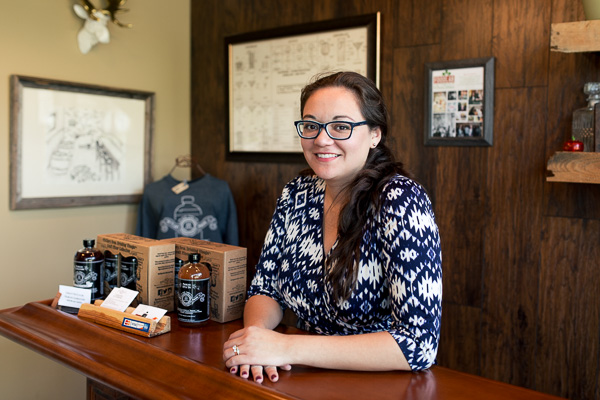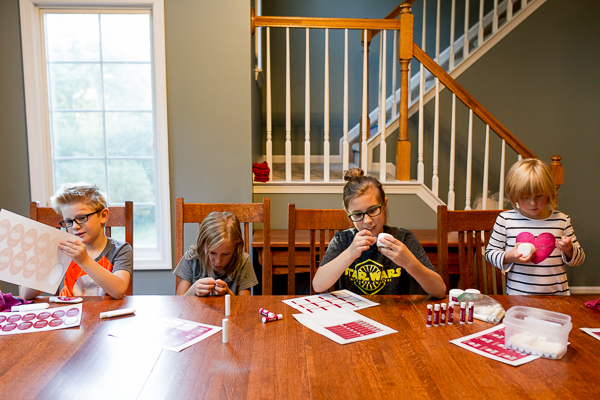Detroit's mother entrepreneurs: these women started businesses and ended up with happy families
Melinda Clynes |
Tuesday, October 25, 2016
This story is part one of a three-part series looking at five women entrepreneurs tackling the challenges of growing a business while creating healthy, stable, happy families. Part two will focus on the strength gained from overcoming gender and racial barriers; part three, on parenting and community.
Jess Sanchez McClary is, admittedly, a serial entrepreneur—she started her first business at nine years old making bracelets to sell at school and hasn't stopped since.
Today, she's the owner of the growing
McClary Bros., which manufactures drinking vinegars. The business recently moved from Farmington to a new facility in Inkster and is on track for a $1 million revenue year with product served or sold in 1,000 locations in 27 states.
It's finally given her financial independence. But the road was long and the fear of failure omnipresent.
 Jess McClary, owner of McClary Bros.
"My family is full of people who work hard, but few have graduated from college. As a result, I think they've all experienced very real ceilings and barriers in their jobs and careers," says Sanchez McClary. "Being an entrepreneur is risky and scary, but it's limitless. You drive your own success, or failure, or both."
Sanchez McClary is one of many Detroit-area women business owners who, as a mother, satiated their thirst for entrepreneurship by starting an independent business. And while entrepreneurship has around-the-clock demands, many women, like McClary, prefer it as a pathway to achieving both financial and family stability.
That drive and fortitude not only impacts families, but in turn, impacts the local economy. According to Ali Webb, director of Michigan programs at the W.K. Kellogg Foundation
Jess McClary, owner of McClary Bros.
"My family is full of people who work hard, but few have graduated from college. As a result, I think they've all experienced very real ceilings and barriers in their jobs and careers," says Sanchez McClary. "Being an entrepreneur is risky and scary, but it's limitless. You drive your own success, or failure, or both."
Sanchez McClary is one of many Detroit-area women business owners who, as a mother, satiated their thirst for entrepreneurship by starting an independent business. And while entrepreneurship has around-the-clock demands, many women, like McClary, prefer it as a pathway to achieving both financial and family stability.
That drive and fortitude not only impacts families, but in turn, impacts the local economy. According to Ali Webb, director of Michigan programs at the W.K. Kellogg Foundation, entrepreneurship is part of any thriving ecosystem, which needs both people creating startups and people in the workforce.
"You've got to have both ends of that equation in order to have a healthy economy," says Webb. "Entrepreneurship, having a steady pipeline of qualified entrepreneurs who want to start businesses and hire people, is a critical part of success for Detroit or, frankly, anywhere else."
W.K. Kellogg, through its Entrepreneurs of Color Fund and other grantmaking, works to provide assistance and funding for budding entrepreneurs, particularly people of color.
Cynthia Davis of Sha La Cynt's, a Detroit gourmet vegan popcorn and dessert company, is emblematic of the type of entrepreneur Kellogg wants in the local economy.
Before forging out on her own in 2013, Davis was a personal chef and worked as an office manager. Now, her business is "kicking tail around the metropolitan area" and has improved the economic and social mobility of her family.
 Cynthia Davis, owner of Sha La Cynt's
Cynthia Davis, owner of Sha La Cynt's
"My family has been placed in a better position to enjoy traveling while staying humble and reflecting on our journey of mom-being-a-paid-employee to now a successful entrepreneur," says Davis.
For Karen Guilmette, who launched her natural personal and family care products company, Natural Red, between 2014 and 2015, financial independence isn't a reality—yet. A single mom of five children, she had been a Detroit Public School teacher turned stay-at-home mom.
Two years ago, Guilmette and her husband divorced after being married 14 years. Both of them wanted her to continue to stay at home with the children, but financially things are tighter than they were when she was married, and she needed more income.
 Karen Guilmette, owner of Natural Red
"My children and I live on child support and alimony
Karen Guilmette, owner of Natural Red
"My children and I live on child support and alimony—
my ex-husband's money. He's generous, which I completely appreciate and am grateful for, but hate at the same time," says Guilmette, who lives in Oakland County. Being able to support herself and her kids is a huge motivator.
"It's more work than I ever could have imagined, but I love it—most of the time," says Guilmette.
"When I started selling, I thought I would sell some body butter and lip balm and be able to afford to buy bagels for my kids each week at school like they wanted," she continues. "My vision for my company has grown exponentially."
 Anderson, Glory, Hudson, and Victory Guilmette help with their mother's business
Anderson, Glory, Hudson, and Victory Guilmette help with their mother's business
The estimated living wage in Michigan for an adult with just three children, versus Guilmette's five, is $68,660, pre tax. So, Natural Red would have to take off for Guilmette to reach what she needs to support her whole family. Yet the typical annual wage for an educator in Michigan is $62,778, according to the National Center for Education Statistics. If successful, Guilmette could have a better chance for financial independence through growing her small business than by returning to her former teaching career.
Like Guilmette, Erin Cole had been working in the school system as a behavior intervention specialist. Ironically, after completing her master's degree in education, Cole decided not to be limited to the classroom.
In 2011, Cole and her partner started their Detroit business Nurturing Our Seeds: Farm, Garden, and Agriculture Education, which creates food havens using blighted space.
"As long as we are depending on a paycheck instead of creating multiple streams of income, we can never truly be financially independent," says Cole.
Nurturing Our Seeds' goal is to make each season's harvest better than the previous one. "No one is going to go harder for you and your dreams than you. That's what we tell ourselves everyday as we hit the fields, even in 91-degree weather," says Cole.
"We are certain the finances will come."
Being a viable ally to the community is also a big driver for Cole. That link to the community is something many local entrepreneurs feel. Fortunately, it has positive social and economic effects.
"We know when businesses are incubated and started locally those dollars go back into that community," says Webb. "They are more likely to hire people from the neighborhood and those dollars are more likely to stay in the neighborhood. That's really critical when you're trying to rebuild neighborhoods."
This article is part of Michigan Nightlight, a series of stories about the programs and people that positively impact the lives of Michigan kids. It is made possible with funding from the W.K. Kellogg Foundation. Read more in the series here.
All photos by Nick Hagen.